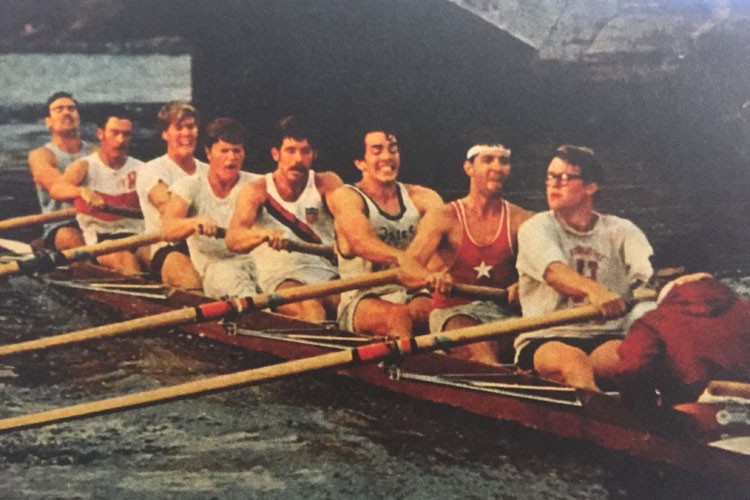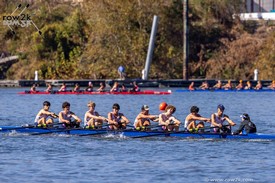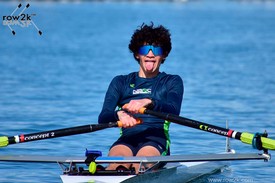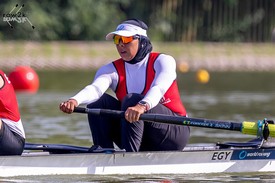Andy Larkin's Life in Boats
Oli Rosenbladt, row2k

Andy Larkin passed away on August 11 2023; we are rerunning our review of his book 'My Life in Boats, Fast and Slow' to remember Andy and his devotion to rowing. The book can be purchased here.
When I rowed and coached in western Massachusetts, everyone seemed to know Dr. Andy Larkin. A physician, ex-Harvard rower, and masters sculler at the Yankee Rowing Club in Hadley, Larkin was well-liked, and people enjoyed talking about his legendary feat of rowing the length of the Connecticut river, from Hadley to the Long Island sound, in an Alden single.
Fewer folks however were aware of Larkin's perhaps more illustrious role while at Harvard; as a member of the 1967 and 1968 Harvard Varsity eights, Larkin was not only part of the first Harvard eight to see significant international success, and the first (and only) Harvard eight to win the US Olympic trials and compete in the Olympic Games, but also had a front-row seat (or rather, a view from the six-seat) of the turbulent social and political upheaval that surrounded not only the Olympics, but unfolded in the world at large during that year.
Luckily, Larkin has addressed this gap in the general rowing oeuvre with the timely publication of his memoir, "My Life in Boats, Fast and Slow" (Off the Common Books, $20.00). In this easygoing if sometimes meandering book Larkin takes his readers on the full arc of his rowing career, from the Taft School to Harvard, to the Olympics, and then, in the "slow boats" of the title, his journeys in sculling introspection, and his long days navigating the Connecticut river downstream to the sea.
Early years and Harvard
Readable and unflinching, Larkin does not spare us any details of his childhood, and the first surprise in a book that was full of them is that Larkin's early years did not particularly dispose him to a future career as an Olympian--if anything, his childhood would have predicted the opposite. At age six, Larkin contracted polio during the epidemic of 1952, which would see 58,000 cases of Polio leave over 21,000 American children with mild to severe paralysis. After a summer in bed, Larkin recovered in time for school in the fall, though not completely unscathed-his ability to participate in sports had taken a hit: "I could walk, but I was the last one to be picked for games. I had neither the mind nor the body to follow balls rapidly through time and space and respond quickly."

At age 13, Larkin headed off to boarding school at Taft, where he found his niche on the school's cross-country team. At 6'3" and 155 pounds, Larkin earned the nickname "Giraffe" from his coach John Small, who also passed on to Larkin advice that seemed to presage his future path. "He said I was too big and slow to run, and that I should take up rowing," Larkin writes. With early admission to Princeton and Harvard in hand, Larkin asked Small which school had the better crews: "He said that Harvard did. That was enough for me."
Larkin entered Harvard in the fall of 1964, and walked on to the heavyweight crew. "I had heard stories of tall people being tracked down and asked to try out for crew. No one came." Larkin struggled his freshman year, missing out on selection for the Eastern Sprints, but earning a seat in the Combi boat (3V/2F combination crew) for the 1965 Harvard-Yale race.
Two anecdotes from this race stand out; one is that, per Larkin, the future hallmark Harvard rowing style (the so-called 'Stop & Shop' rhythm, where the hands pause at the finish of the stroke, prior to moving out of bow), which later on became the distinguishing characteristic of Harvard heavyweight crews from the late 1960s until the 1970s, was 'invented' by the combi boat at Red Top in 1965.
"One day Jake [Fiechter, stroke and future '68 Olympian] suggested that we should pause at the finish of the stroke and let the boat run before beginning the next stroke. This was the start of what was to be called 'Stop & Shop.' Jake recalls how well the boat drove with this modification."
With their new stroke, the Harvard combi crew easily defeated their counterparts from Yale. The crew raced with the motto "Ex Nemo" mounted on their bow; a flag with this motto can be seen flying at Harvard's Red Top camp for the Harvard-Yale regatta to this day. (The motto is short for "ex nemo non feces", or bad Latin for "no crap from no one.")
From that spring, Larkin and Harvard picked up speed steadily; Larkin would win his first (and only) seat race for the Varsity eight in spring of 1966, went undefeated with the crew that spring, and remained in the boat for the remainder of his time at Harvard. The '66 Harvard crew competed and won at the Pan Am Trials, and won the Pan Am regatta in Winnipeg that summer, while in 1967 the crew steadily improved, and competed at the European Championships at Vichy, coming in a close second to the vaunted West Germans.
What stands out as Larkin recounts the successes of Harvard crew through the 1960s is that Larkin not only skillfully places his experience in the context of nearly 100 years of Harvard rowing up to that point, illuminating the checkered and not-always-illustrious history of the sport at the self-anointed 'World's Greatest University,' but also sheds unexpected, new light on one of the most-discussed figures in American rowing, Harvard coach Harry Parker. Larkin's book offers some of the more illuminating recent passages on Parker's coaching approach and legacy, adding considerably to the understanding of Parker, as a man and a coach.
Perhaps most valuable to modern readers is the understanding that Parker never had a monolithic view of the rowing stroke, but continued to evolve his understanding of what would make boats move, reinventing himself when necessary. Larkin illustrates this well with an anecdote Parker told to Peter Mallory in Volume III of Mallory's "The Sport of Rowing."
"We rowed really hard, a hard catch. I shudder thinking of it today. I watch these guys row off the dock [in reunion rows at the Head of the Charles] and think 'Oh my God!' But we actually rowed like that."
1968
In the core of the book, and arguably making his finest contribution to the greater ledger of American rowing history, Larkin recounts the full details of the Harvard crew's journey through the season, Olympic trials and the 1968 Olympics in Mexico City. It's a pretty unsparing view--by his account, the year 1968 sounds as if it took every last fiber of being out of him and pretty much everyone in his crew.
While Harvard took the Eastern Sprints and the Harvard-Yale race without and great difficulties, the journey to the Olympics was fraught; injuries and illness plagued Larkin and Harvard throughout the spring, and Ted Nash's Penn crew, reinforced with with standout freshman athletes after the Eastern Sprints, pushed Harvard to the absolute limit at the Olympic Trials in Long Beach, California, with Larkin's Harvard crew prevailing in a photo finish by a mere .005 seconds.

The Olympic berth secured, the crew's fortunes seemed to go down rather than up; Larkin himself is spent, and details his struggles in keeping his health and fitness intact through a long summer prior to the Olympics. Larkin's descriptions of the crew's travails in what was, at the time, one of the first altitude training camps for rowing prior to the Olympics makes one wonder how the crew stayed intact.
The 1968 Olympics, of course, came at a time of considerable political ferment in the US and the world over, and Larkin does an exceptional job weaving together the disparate strands of Harvard, rowing, the Olympics, and social justice concerns that animated the world at the time. It's the strongest part of the book, particularly in his retelling of the role that members of the Harvard crew, particularly coxswain Paul Hoffman, played in supporting the Olympic Project for Human Rights (OPHR), a movement started in California by professor Harry Edwards of San Jose State University.
Six of the nine members of the Harvard eight, including Larkin, sent letters to their fellow Olympians, explaining their support for the project, but received only few responses.
At the Olympics, Hoffman famously provided the OPHR button to Australian runner Peter Norman, who was on the podium along with US track and field athletes John Carlos and Tommy Smith, whose famous "black power" salute after receiving their Olympic medals became an iconic image of the US civil rights struggle, but also led Smith and Carlos to be blackballed from the USA Olympic movement.

Indeed, Hoffman's action, occurring between the repechage and the final of the Olympic regatta, almost cost the US eight their coxswain, as the heads of the US delegation debated stripping Hoffman of his credential and sending him home; in the end, he was permitted to race, and he coxed the crew to a 6th place finish, a final ending to what had been a shattering summer.
Larkin does not stint in sharing some of the abuse the crew took as a result of their stand in Mexico City. Larkin quotes from a letter Douglas Roby, then the president of the USOC, sent to Harry Parker after the Olympics.
Life after the Olympics
After dropping his oars, seemingly for good, after the Olympics, it takes several decades for Larkin to get back in the boat, but when he does, it's with an eye for peace and quiet. Larkin details his reentry to sculling, and his eventual exploration, via sculling, of his childhood environs. In his meticulous recounting of his preparations and his journeys down the Connecticut, you sense the same, detailed mind who captured life in the "fast" boats earlier in the book in the descriptions and history of the landscapes he is now passing by slowly.
In his memoir, Andrew Larkin has shone a bright light on an underexamined episode in American rowing history in the context of a life fully well-lived in rowing. If the later sections of the book read as an afterthought to the more exciting middle section of the book, it's almost akin to reading an armistice story after a war story, but the sections complement each other.
Andy Larkin has written a fine, sensitive book, whose central lessons ranging from rowing to holding fast to ones' beliefs resonates broadly.
In his Epilogue, Larkin ruminates on the lessons of 1968: "What strikes me most, fifty years later, was how benign our efforts were, how much more our response was than many others, and how much opposition our actions provoked from the USOC."
Timely words for 2018, one could argue.
'My Life in Boats, Fast and Slow' can be purchased from Off the Common Books
If you enjoy and rely on row2k, we need your help to be able to keep doing all this. Though row2k sometimes looks like a big, outside-funded operation, it mainly runs on enthusiasm and grit. Help us keep it coming, thank you! Learn more.
Comments | Log in to comment |
- Bont Rowing
- Calm Waters Rowing
- Concept 2
- Craftsbury Sculling
- The Crew Classic
- CrewLAB
- Croker
- Durham Boat Co.
- Empacher
- Faster Masters
- Filippi
- Fluidesign
- h2row.net
- HUDSON
- Live2Row Studios
- Nielsen-Kellerman
- Oak Ridge RA
- Peinert Boat Works
- Pocock Racing Shells
- Race1 USA
- RowKraft
- Rubini Jewelers
- Vespoli USA
- WinTech Racing
- Bont Rowing
- Calm Waters Rowing
- Concept 2
- Craftsbury Sculling
- The Crew Classic
- CrewLAB
- Croker
- Durham Boat Co.
- Empacher
- Faster Masters
- Filippi
- Fluidesign
- h2row.net
- HUDSON
- Live2Row Studios
- Nielsen-Kellerman
- Oak Ridge RA
- Peinert Boat Works
- Pocock Racing Shells
- Race1 USA
- RowKraft
- Rubini Jewelers
- Vespoli USA
- WinTech Racing


















09/26/2023 3:55:34 PM
02/24/2019 10:09:39 AM